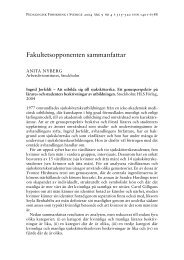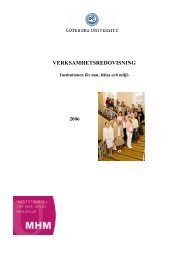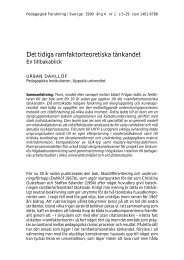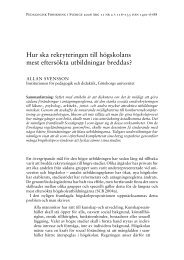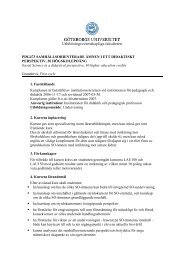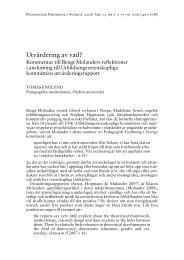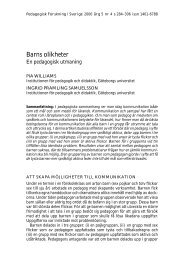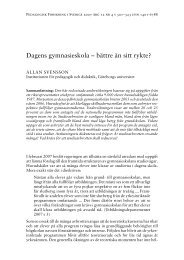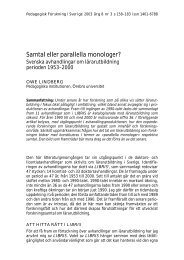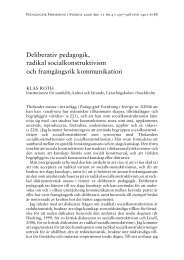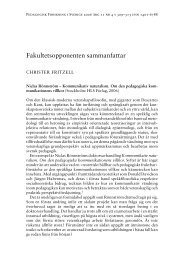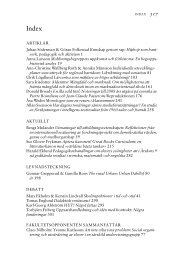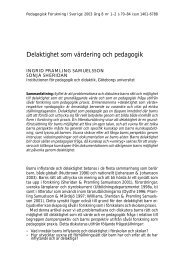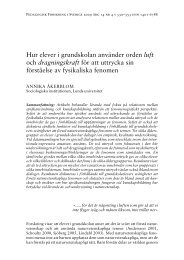University of Oslo Workshops June 29-30 Conference July 1-3 ...
University of Oslo Workshops June 29-30 Conference July 1-3 ...
University of Oslo Workshops June 29-30 Conference July 1-3 ...
You also want an ePaper? Increase the reach of your titles
YUMPU automatically turns print PDFs into web optimized ePapers that Google loves.
Track B PIRLS/TIMSS - Session 5<br />
Teacher Characteristics and Curricula in Relation to Student<br />
Achievement<br />
2 <strong>July</strong><br />
13.00-15.00<br />
Room: AK 2137<br />
Chair: Ruth Zuzovski<br />
Discussant: Kathleen Trong<br />
Reference Group Effects on Teachers’ School Track Recommendations:<br />
Results from PIRLS 2006 Germany<br />
Anne Milek, Max Planck Institute for Human Development, Berlin, Germany<br />
Tobias Stubbe, Institute for School Development Research, Dortmund, Germany<br />
Ulrich Trautwein, Eberhard Karls <strong>University</strong>, Tübingen, Germany<br />
Oliver Luedtke, Eberhard Karls <strong>University</strong>, Tübingen, Germany<br />
Kai Maaz, Max Planck Institute for Human Development, Berlin, Germany<br />
In the German education system, the transition from elementary to secondary school<br />
represents an early form <strong>of</strong> selection with far-reaching implications for students’<br />
educational biographies. This paper examines the extent to which teachers’<br />
recommendations <strong>of</strong> a secondary track are systematically related to mean class<br />
achievement level and whether there are differences in this reference group effect across<br />
the federal states. Using the German PIRLS 2006 dataset (7,752 students from 388 fourthgrade<br />
classes), multilevel logistic regression models were used to examine the relationship<br />
between the recommendations made by elementary school teachers and mean class<br />
achievement level in each <strong>of</strong> the 16 German federal states (Länder). Findings show a<br />
negative correlation between mean class achievement and teachers’ recommendations that<br />
was mediated by school grades. Cross-state differences in the size <strong>of</strong> reference group<br />
effects did not reach a statistically significant level.<br />
Keywords: reference group effect; transition to secondary education; teachers’<br />
recommendations<br />
Relationship among Curriculum Coverage, Teacher Preparedness, and<br />
Student Achievement in TIMSS Advanced 2008<br />
Alka Arora,TIMSS & PIRLS International Study Center, Boston College, USA<br />
<br />
This study was built on the long history <strong>of</strong> IEA studies considering curriculum coverage as<br />
central to students’ opportunities to learn. It uses the TIMSS Advanced 2008 achievement<br />
data for advanced mathematics and the extensive information about curriculum coverage<br />
provided by participating countries to develop country-by-country pr<strong>of</strong>iles <strong>of</strong> the<br />
relationship between curriculum coverage and achievement at the topic level. More<br />
specifically, for each country, a topic-by-topic analysis was done for 16 advanced<br />
53



